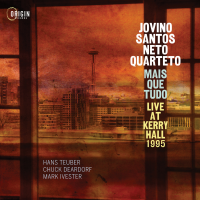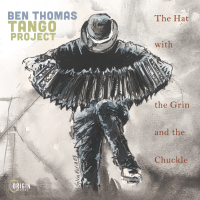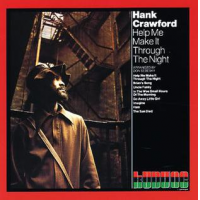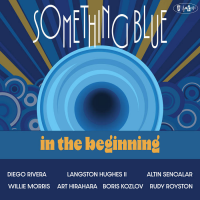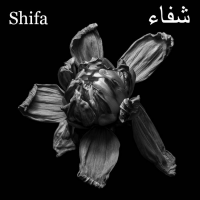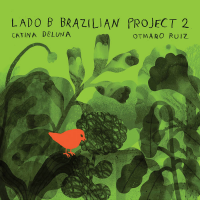Home » Jazz Articles » Liner Notes » George Colligan: Ultimatum
George Colligan: Ultimatum

Charles Mingus
bass, acoustic1922 - 1979

Duke Ellington
piano1899 - 1974

Thad Jones
trumpet1923 - 1986

George Colligan
multi-instrumentalistb.1969

Cassandra Wilson
vocalsb.1955

Lonnie Plaxico
bassb.1960

Don Braden
saxophone, tenorb.1963

Ravi Coltrane
saxophone, tenorb.1965

David Gilmore
guitar
Miles Davis
trumpet1926 - 1991

Freddie Hubbard
trumpet1938 - 2008

Clifford Brown
trumpetb.1930
Following high school, Colligan attended Peabody Conservatory as a trumpet major, although he would eventually change the course of his creative pursuits by switching back to piano. Without much in the way of formal training, Colligan got his pianistic skills together and soon became a mainstay on the Washington/Baltimore club curcuit, where he would perfect his craft via gigs with

Buck Hill
saxophone, tenorb.1927

Gary Thomas
saxophoneb.1961
Although Ultimatum is Colligan's first effort for Criss Cross, he had made the acquaintance of producer Gerry Teekens while searching for a record deal upon arrival in New York. "Gerry came to hear me at Bradley's with

Steve Wilson
saxophoneb.1961

Dwayne Burno
bass1970 - 2013

Don Byron
clarinetb.1958

Ralph Peterson
drums1962 - 2021
Critical to the artistic atmosphere that spawned Ultimatum was the presence of Gary Thomas, a harmonically advanced saxophonist and flutist whose involvement with academia keeps him just a few degrees below the radar of the current scene. Both men had worked together previously and the pianist admits to being greatly influenced by such Thomas albums as 1991's The Kold Kage. "The first time I heard Gary was on a

Wallace Roney
trumpet1960 - 2020
Another prime element significant in the interpretation of Colligan's charts is drummer Ralph Peterson, Jr., who appeared on the pianist's maiden voyage, Activism. A recent addition to the Criss Cross stable himself, the drummer can be heard on his own critically-acclaimed The Art of War (Criss 1206) and has been a prized sideman and leader of his own ensembles since the mid-'80s. "He truly has his own style, yet has more of an understanding of the jazz tradition than most," Colligan says about his esteemed colleague. "I always enjoy playing with Ralph because no matter how many ideas he plays, his time is rock steady and he always plays the form. Ralph is truly one of the great drummers of our time."
The third leg of a well-anchored rhythm trio, bassist

Drew Gress
bassb.1959

Dave Douglas
trumpetb.1963

Uri Caine
pianob.1956

Ellery Eskelin
saxophone, tenorb.1959
The hard swinging "Ultimatum" gets this program of all originals underway and the synergy that this quartet displays helps make the advanced charts swing in a deeply gratifying manner. "This one was originally called Gary's Groove, for

Gary Bartz
saxophone, altob.1940
Utilizing odd meters in an unconscious way that makes the melody flow logically, Ancestral Wisdom contains passages of two-fisted brilliance from Colligan, not to mention the darkly provocative flute work of Thomas. "The melody is simple, yet the rhythm and harmony are much deeper. Which made me think about those pearls of wisdom, like the Confucian sayings, that are simple on the surface, but when applied to a real life situation become much deeper."
"'Catalyst' started out as just some chord changes to improvise over, sort of like

Herbie Hancock
pianob.1940
If you listen closely, the first phrase of "Was It Not Meant To Be?" nicely echoes those words as if to suggest that George had some lyrical content in mind. "I was looking for a less intense, slower mood without playing the traditional jazz ballad sort of time, with sweeping brushes and the like." Following a harmonious bass solo, Thomas picks up his flute again before George speaks at length. "Gary wails on the flute and these chord changes are not for the faint of heart. Plus, Ralph is great for this type of tune because you know it will be the same tempo at the end because his time is so strong."
A modal line with some grit and substance, "Shiva's Dance" finds Peterson skating in and out of the melodic framework with some pointed interjections. "Everybody seemed to enjoy playing on this one and we knocked it out in one take. But this is the kind of tune that when performed live would be 15 minutes or more, it has so much momentum to it." Colligan, Thomas, and Peterson get to stretch out before the reprise of the head.
Offering a change in mood, "Silkscreen" is a solo piano performance that unfolds in a way that roughly evokes the tide breaking on the shore. "I wrote this when I was staying at a friend's in Edmonton, Canada," says George of the tune's genesis. "I had just looked at some silkscreen paintings at a museum. They were all scenes of beach houses in very calm and peaceful settings."
In regards to the propulsive "Across," Colligan clarifies the intent of some complex rhythmic shifts by explaining, "I was hearing some kind of 6/8 thing, like African clave, but then I wanted to make it uneven and unpredictable. This tune is so complex that we spent most of this performance trying to keep the form and not get lost! But this is the first take and Gary and Drew play excellent solos on a structure that became a challenge to navigate."
Gentle and ruminative, "Wishful Thinking" provides another wonderful forum for the idiosyncratic flute work of Thomas. Colligan says of the piece, "It's more of a traditional jazz ballad. It's sort of like those Wayne Shorter structures that are short in duration, but at the same time you get a lot of mileage out of them."
"Lords of Justice" is given a darkly ominous air that is tailor made for Thomas, who makes the most of a demanding structure. "It's my rock anthem tune," says George, succinctly describing the backbeat groove at the heart of the form. He then adds, "It's the theme song for perhaps some imaginary superheroes that might fly down and solve the Middle East conflict or set things right in the world."
Over the course of nine disparate compositions, the implications of the album's title come to mind in that Colligan's music demands your attention due to its technical virtuosity and rhythmic diversity. Furthermore, it's fresh, forward thinking, and bodes well for Colligan's pioneering efforts yet to come.
Liner Notes copyright ? 2025 C. Andrew Hovan.
Ultimatum can be purchased here.
Contact C. Andrew Hovan at All About Jazz.
An avid audiophile and music collector, Chris Hovan is a Cleveland-based writer / photographer / musician.
Track Listing
Ultimatum; Ancestral Wisdom; Catalyst; Was it Not Meant to Be?; Shiva's Dance; Silkscreen; Across...; Wishful Thinking; Lords of Justice.
Personnel
Album information
Title: Ultimatum | Year Released: 2002 | Record Label: Criss Cross
Tags
Comments
About George Colligan
Instrument: Multi-instrumentalist
PREVIOUS / NEXT
Support All About Jazz
 All About Jazz has been a pillar of jazz since 1995, championing it as an art form and, more importantly, supporting the musicians who make it. Our enduring commitment has made "AAJ" one of the most culturally important websites of its kind, read by hundreds of thousands of fans, musicians and industry figures every month.
All About Jazz has been a pillar of jazz since 1995, championing it as an art form and, more importantly, supporting the musicians who make it. Our enduring commitment has made "AAJ" one of the most culturally important websites of its kind, read by hundreds of thousands of fans, musicians and industry figures every month.







 Buy Now
Buy Now



